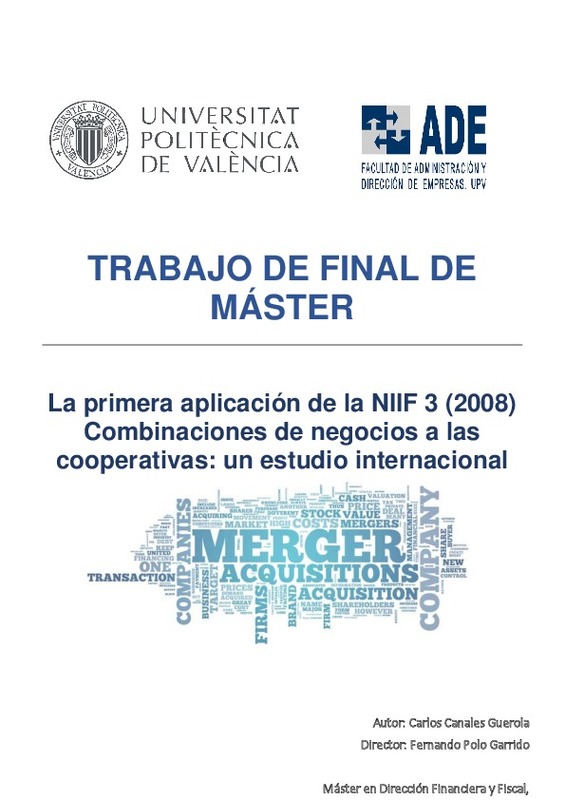|
Resumen:
|
[ES] El desarrollo de la economía y las comunicaciones exige a las empresas adaptarse a un
entorno cada vez más dinámico. Una de las formas más habituales de hacerlo son las
combinaciones de negocios, son operaciones ...[+]
[ES] El desarrollo de la economía y las comunicaciones exige a las empresas adaptarse a un
entorno cada vez más dinámico. Una de las formas más habituales de hacerlo son las
combinaciones de negocios, son operaciones intersocietarias, en las que una entidad
obtiene el control de otra y con ello la responsabilidad de informar en sus estados
financieros, se manifiestan en forma de absorciones, fusiones y adquisiciones de
negocios entre otras.
En el siguiente trabajo de final de máster, se realizará un estudio teórico de la evolución
de la normativa aplicada a combinaciones de negocios establecida NIIF 3 y SFAS 141R,
y su aplicación a sociedades cooperativas o mutualistas. Consecutivamente, en la parte
empírica de la tesina, se analizará la aplicación de la normativa internacional NIIF 3
(2008), adoptando distintos enfoques como el análisis de la divulgación de los aspectos
más relevante establecidos por la normativa IFRS y GAAP en entidades cooperativas,
la divulgación de la normativa IFRS 3 (2008) en sociedades cooperativas y mutualistas
frente a las figuras societarias más comunes (sociedades anónimas) y, por último, se
efectuará un breve estudio del deterioro del fondo de comercio.
El estudio tendrá alcance internacional, se examinarán las entidades cooperativas más
relevantes del mundo por cifra de ingresos, y se estudiarán los periodos 2009,2010 y
las cuentas anuales más actuales, con la finalidad de efectuar un estudio minucioso del
proceso de implementación de la normativa relativa a combinaciones de negocios en
cooperativas.
Tras realizar el estudio teórico y empírico de los estándares establecidos, concluimos
que la normativa no se presenta de manera uniforme, la mayoría de las sociedades
cooperativas, muestran la información necesaria establecida por la norma
incoherentemente. Muchos aspectos establecidos por la normativa IFRS 3 (2008)
relativos a cuestiones sensibles no se exponen, asumimos que la intención de no
divulgar esta información es proteger su ventaja competitiva frente a la competencia.
Sin embargo, en todos los casos estudiados, el resultado de las auditorías es favorable,
por lo tanto, en la actualidad las firmas de auditoría tampoco consideran necesario
cumplir estrictamente la divulgación de la información requerida por la IFRS 3 (2008).
[-]
[EN] The development of the economy and communications requires companies to adapt
themselves to an increasingly dynamic environment. One of the most common ways of
doing this is through business combinations. These are ...[+]
[EN] The development of the economy and communications requires companies to adapt
themselves to an increasingly dynamic environment. One of the most common ways of
doing this is through business combinations. These are inter-company transactions in
which one society obtains the control of another one and also the responsibility of
reporting in their financial statements, the usual ways of realization of business
combination are absorptions, merger and acquisitions of a business.
The following end master’s project will contain: a theoretical study of the evolution of
rules applied to business combinations established by IFRS 3 and SFAS 141R, and their
application to cooperatives or mutual companies. Subsequently, in the empirical part of
the thesis, the application of the international standard IFRS 3 (2008) will be analysed
adopting approaches such as: the analysis of the disclosure of the most relevant aspect
established by IFRS and GAAP to cooperative companies, the disclosure of IFRS 3
(2008) in cooperatives and mutual societies in comparison with the most common
societies (the limited companies), and finally a brief study of the goodwill’s impairment
will be done.
The study will be an international scope, it will examine the most relevant co-operative
companies in the world by income figure in the periods 2009,2010 and the most current
financial statements in order to carry out a detailed study of the implementation process
of the regulations related to business combinations in cooperatives or mutual entities.
After performing the theoretical and empirical study of the established standards, we
conclude that the adjustments haven’t been showed correctly on financial statements,
most cooperative societies submit the information required by the international standards
disordered. Many aspects established by IFRS 3 (2008) regarding sensitive information
of business combination aren’t disclosed, we assume that the intention to not disclose
this kind of information is to protect his competitive advantage against competition
companies. However, in all the cases studied, the audit report results are favourable,
therefore, audit firms don’t consider necessary to strictly comply with the disclosure of
the information required by IFRS 3 (2008).
[-]
|







